
Tenses in Pairs, Part 1 Liv Hambrett
This page provides example sentences of the verb "See" in all tenses including active and passive forms, as well as conditional and modal forms. Present Simple Use the present simple for routines and habits such as how often you see a person. We see them every week. How often do you see Tim? She doesn't see Peter every day. Present Simple Passive

16 Tenses in English Grammar (Formula and Examples) ExamPlanning
Matt Ellis Updated on May 10, 2023 Verb tenses are changes or additions to verbs to show when the action took place: in the past, present, or future. The phrase verb tense is also used for grammatical aspects, which add more details about the duration or time an action takes.

Verbs Archives Page 96 of 100 English Study Here
What is the past tense of "see?". Most commonly, the past tense of the word "see" is "saw.". Although the word form will change based on its participle. And the sentence where it's used. For example, referencing "see" in the present participle form will change it to "seeing," but in the infinitive form, will be "see.".

12 Types of Tenses in English with Examples » OnlyMyEnglish
se en definition in Spanish in French in Italian Indicative Perfect tenses Continuous (progressive) and emphatic tenses Compound continuous (progressive) tenses Conditional Imperative Subjunctive *Blue letters in conjugations are irregular forms. ( example) *Red letters in conjugations are exceptions to the model. ( example)
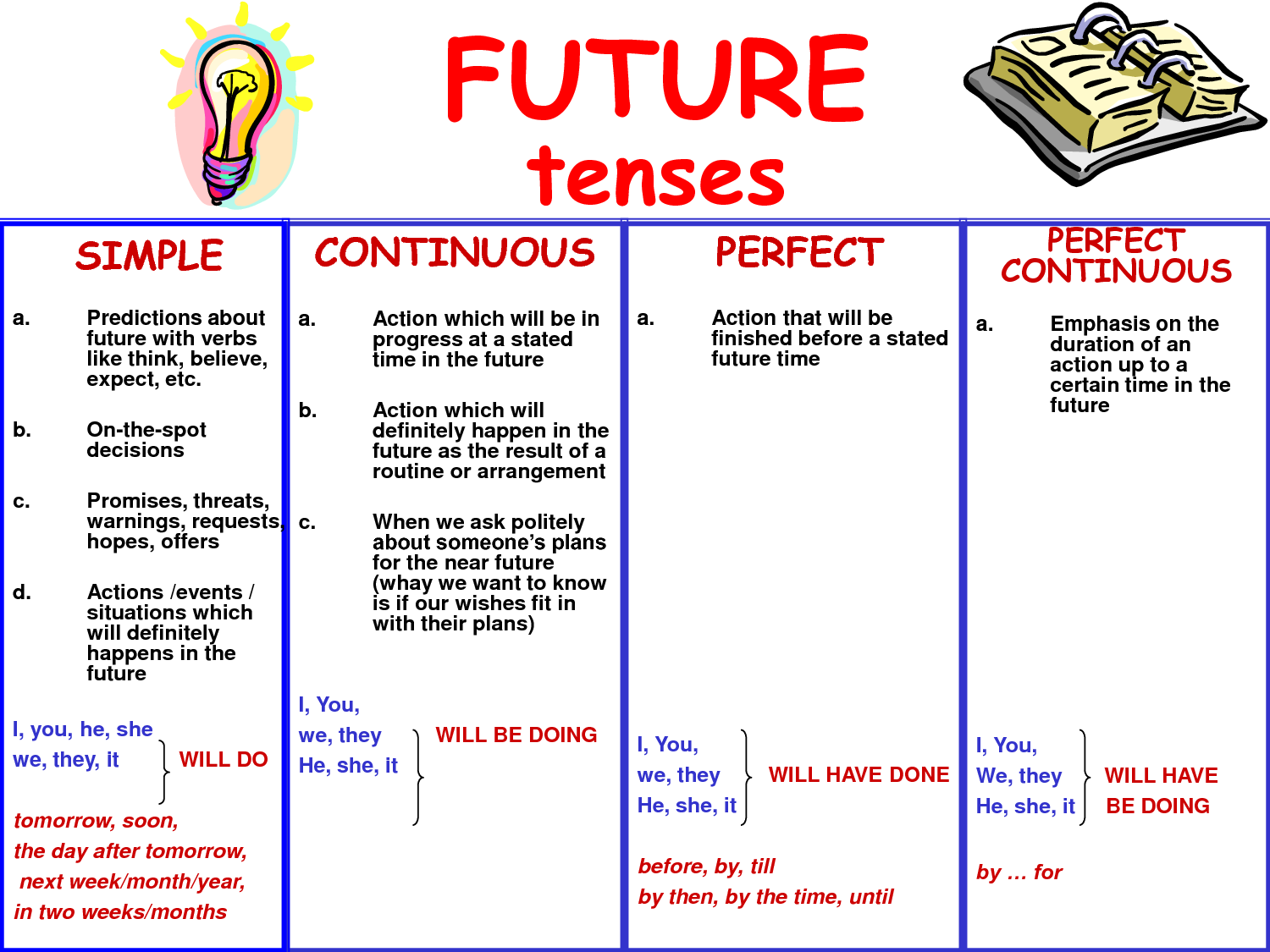
E4success Future Tenses
Past participle seen Model : see Auxiliary : have, be Other forms: see oneself / not see Contractions Advertising Indicative Present I see you see he/she/it sees we see you see they see Preterite I saw you saw he/she/it saw we saw you saw they saw Present continuous I am seeing you are seeing he/she/it is seeing we are seeing you are seeing

Past Tense Of See, Past Participle Form of See, V1 V2 V3 Past Tense of
Present Tenses Future Tenses Most Common Irregular Verbs The two most common irregular verbs in English are "be" and "have." These pages give more details about these two verbs: the verb "to be" the verb "to have" Here are the next 10 most common irregular verbs in English: see (this page), say, go, come, know, get, give, become, find, and think

Verb Tenses How To Use The 12 English Tenses With Useful Tenses Chart
Tenses of ' see '. . See is an irregular verb with two past verb forms, neither of which end in - ed in their past forms: saw and seen. Regular verbs end in - ed in their past verb forms, like walk/walked, talk/talked, and laugh/laughed. This makes the verb see a bit more complicated when conjugating to its past verb forms.
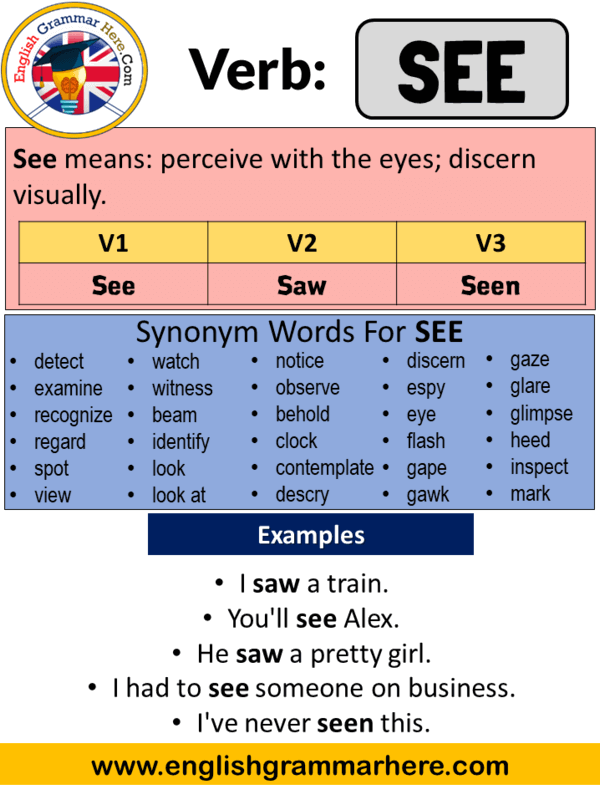
See Past Simple, Simple Past Tense of See Past Participle, V1 V2 V3
Spoken English: When we see something as we are speaking, we usually say can see rather than the simple (I see) or continuous form (I'm seeing): I can see you in the photo. Look, there you are at the very back. We use see to mean 'understand, know or be aware of something'. We don't usually use this in continuous form:

Verb Tenses Definitions and How to Use Them Correctly TCK Publishing
Conjugation Simple Tense Present Simple I see you see he, she sees we see you see they see Past Simple I saw you saw he, she saw we saw you saw they saw Future Simple I will see
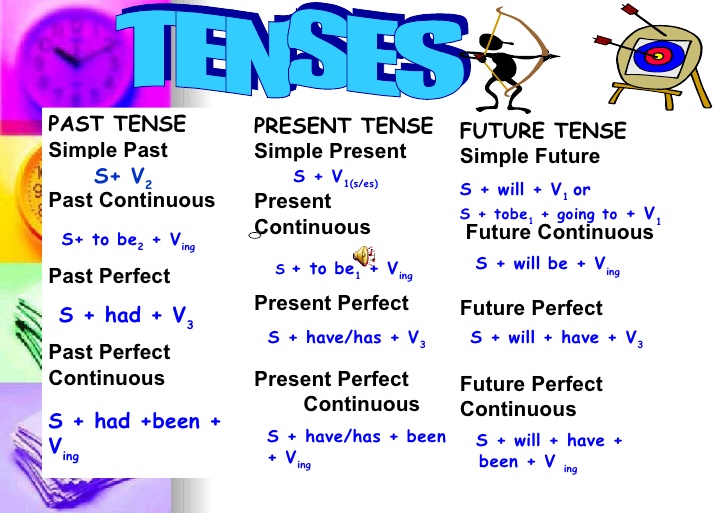
12 Types of Tenses PDF Examples With Definition
Verb to see - English conjugation Print - Export to Word English verb conjugation TO SEE Irregular verb: see - saw - seen Indicative | Conditional | Imperative | Infinitive | Participle Indicative Present I see you see he see s we see you see they see Present continuous I am see ing you are see ing he is see ing we are see ing you are see ing

What is the Past Perfect Tense? See examples and how to form the Past
3 forms of verb see: Infinitive (see), Past Simple - (saw), Past Participle - (seen). Here are the past tense forms of the verb see 👉 Forms of verb see in future and past simple and past participle. What is the past tense of see. See: Past, Present, and Participle Forms What are the 2nd and 3rd forms of the verb see?
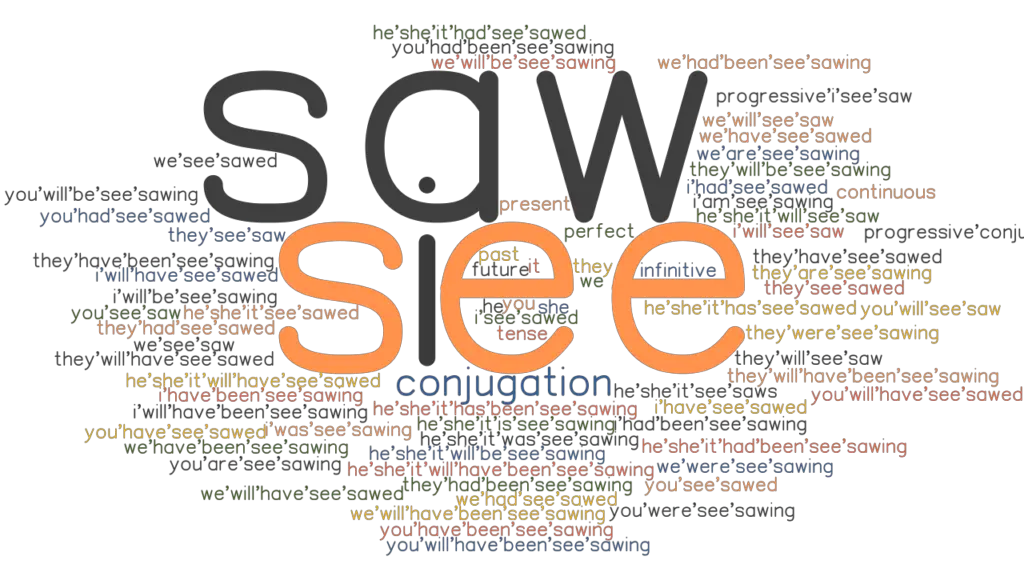
Seesaw Past Tense Verb Forms, Conjugate SEESAW
Conjugate the verb see in all tenses: present, past, participle, present perfect, gerund, etc.. Verb Table for see. Simple tenses; Continuous tenses; Conditional; Imperative; Impersonal;. We are using the following form field to detect spammers. Please do leave them untouched.
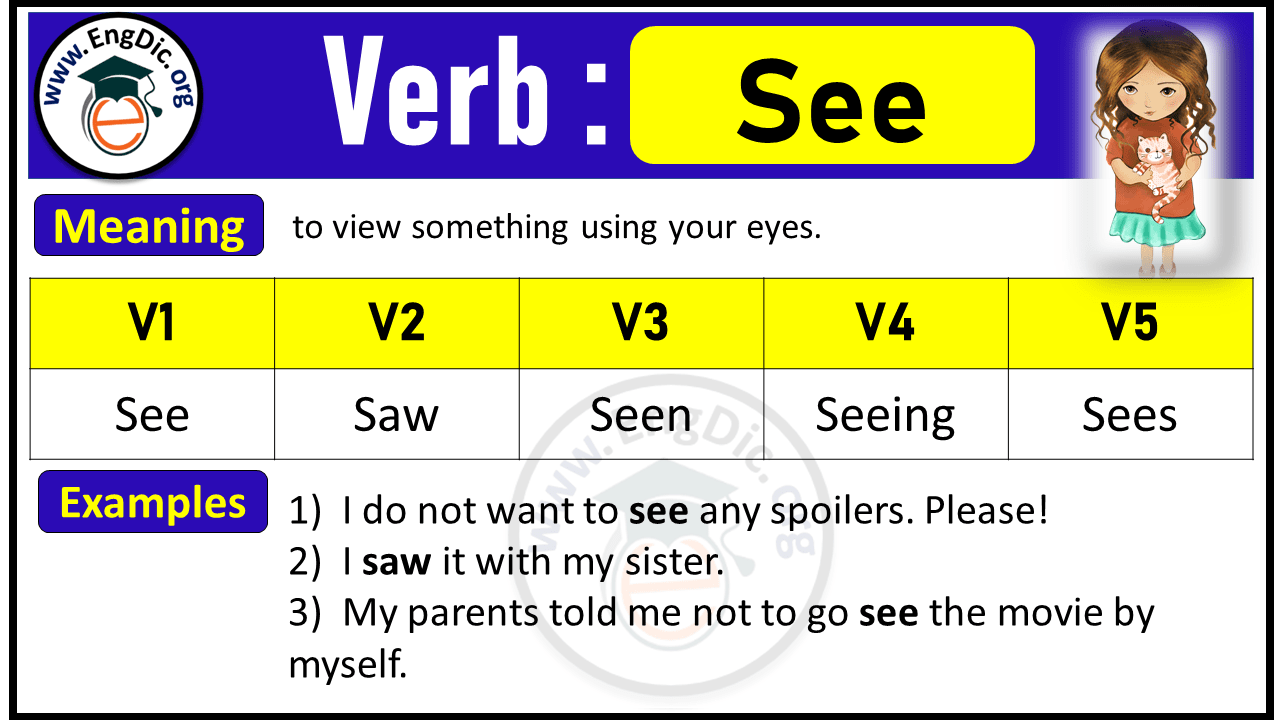
See past participle EngDic
To See Conjugation - All English Verb Forms English To See Infinitive: to see Gerund: seeing Past participle: seen Simple past: saw Irregular forms Auxilliary verb Spelling change Use contractions Indicative Present I see you see he/she/it sees we see they see you see Preterite I saw you saw he/she/it saw we saw they saw you saw Future Perfect

Tense Chart With Rules And Examples Pdf A Comprehensive Guide Dona
Grammar Reference Irregular Verbs List Definition: To See Irregular verb: To See Verb conjugation: See - Saw - Seen Meaning of 'To See' To notice with your eyes Conjugation of verb 'See' Irregular Verbs Following a Similar Pattern Verbs like: UsingEnglish.com is partnering with Gymglish to give you a Want to learn about the irregular verb 'to See'?
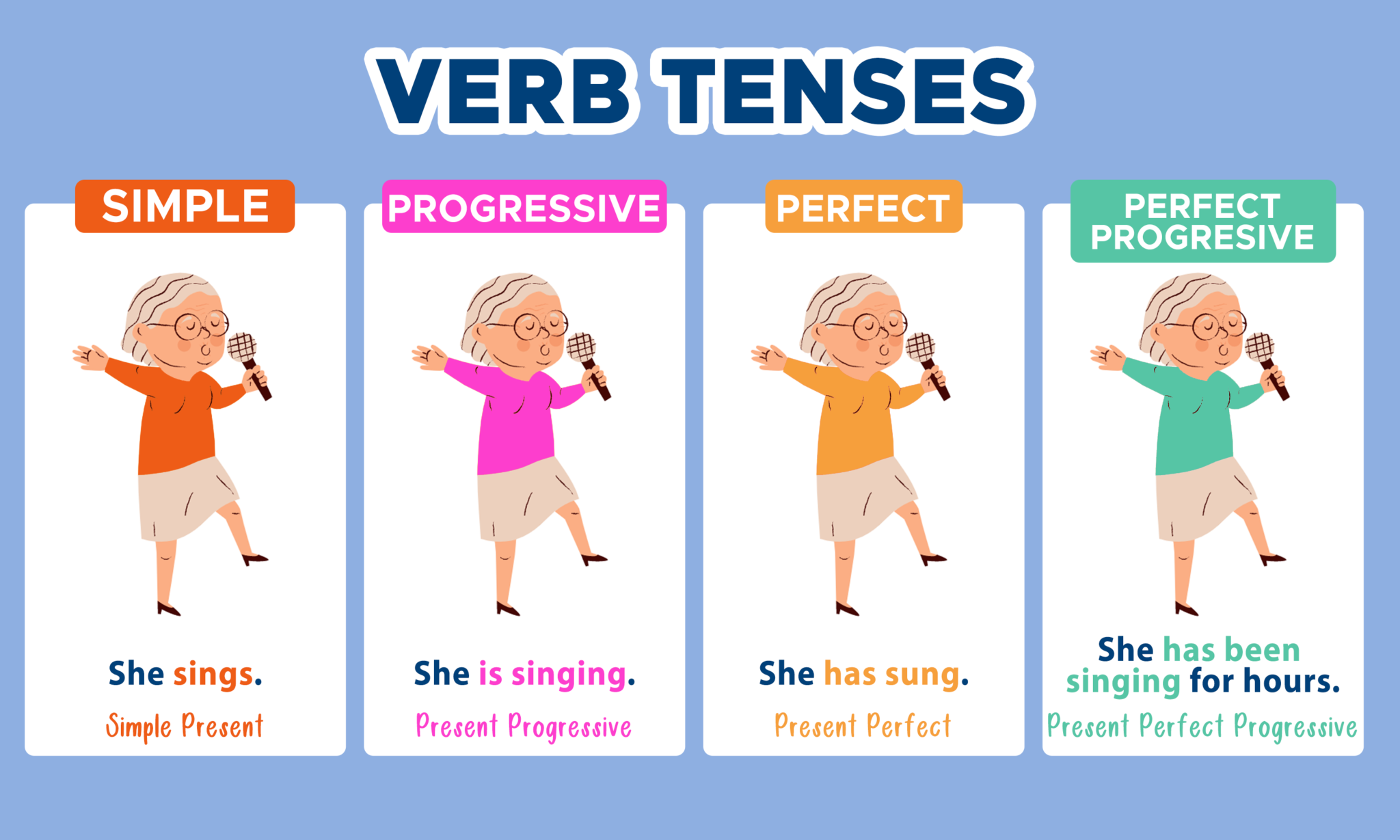
Verb Tenses When an Action Occurs Curvebreakers
The Conjugation and Declension service allows you to conjugate verbs and decline nouns, adjectives, pronouns and numerals. Here you can find out the gender and declension of nouns, adjectives and numerals, the degrees of comparison of adjectives, conjugation of verbs, and see the table of tenses for English, German, Russian, French, Italian, Portuguese and Spanish.

Conjugation See 🔸 Verb in all tenses and forms Conjugate in past
Conjugation English verb to see in several modes, tenses, voices, numbers, persons : indicative mode, subjunctive, imperative mood, conditional, participle form, gerund, present, past, future perfect, progressive. The-conjugation.com. Menu. Other languages available English. you will see he will see we will/shall see you will see they will.